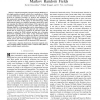Free Online Productivity Tools
i2Speak
i2Symbol
i2OCR
iTex2Img
iWeb2Print
iWeb2Shot
i2Type
iPdf2Split
iPdf2Merge
i2Bopomofo
i2Arabic
i2Style
i2Image
i2PDF
iLatex2Rtf
Sci2ools
108
Voted
TMI
1998
1998
Spatio-temporal fMRI Analysis using Markov Random Fields
Abstract—Functional magnetic resonance images (fMRI’s) provide high-resolution datasets which allow researchers to obtain accurate delineation and sensitive detection of activation areas involved in cognitive processes. To preserve the resolution of this noninvasive technique, refined methods are required in the analysis of the data. In this paper, we first discuss the widely used methods based on a statistical parameter map (SPM) analysis exposing the different shortcomings of this approach when considering high-resolution data. First, the often used Gaussian filtering results in a blurring effect and in delocalization of the activated area. Secondly, the SPM approach only considers false alarms due to noise but not rejections of activated voxels. We propose to embed the fMRI analysis problem into a Bayesian framework consisting of two steps: i) data restoration and ii) data analysis. We, therefore, propose two Markov random fields (MRF’s) to solve these two problems. Result...
Related Content
| Added | 23 Dec 2010 |
| Updated | 23 Dec 2010 |
| Type | Journal |
| Year | 1998 |
| Where | TMI |
| Authors | Xavier Descombes, Frithjof Kruggel, D. Yves von Cramon |
Comments (0)

